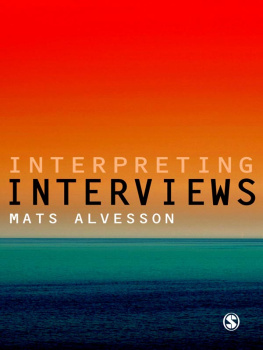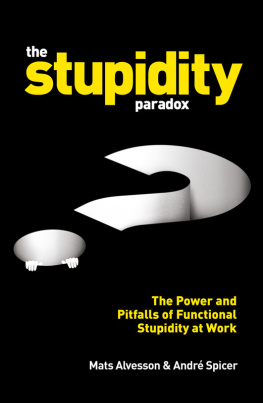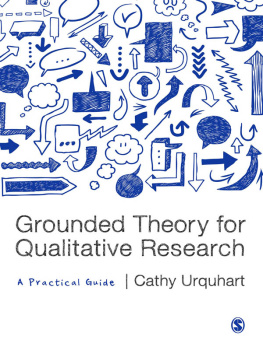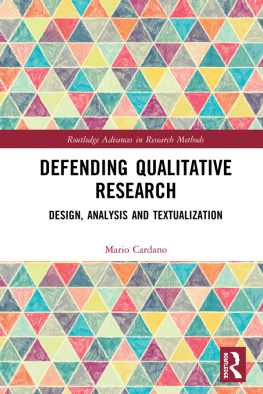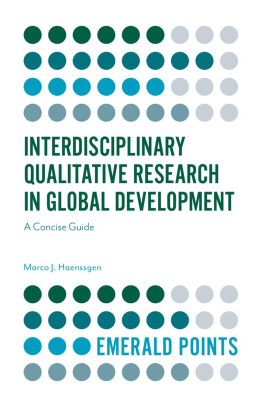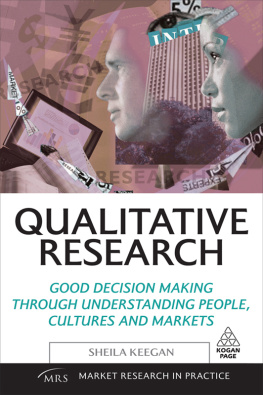Qualitative Research and
Theory DevelopmentSAGE has been part of the global academic community since 1965, supporting high quality research and learning that transforms society and our understanding of individuals, groups, and cultures. SAGE is the independent, innovative, natural home for authors, editors and societies who share our commitment and passion for the social sciences.
Find out more at: www.sagepublications.com
Qualitative Research
and Theory Development
Mystery As Method
Mats Alvesson and Dan Krreman
Mats Alvesson and Dan Krreman 2011
First published 2011
Apart from any fair dealing for the purposes of research or private study, or criticism or review, as permitted under the Copyright, Designs and Patents Act, 1988, this publication may be reproduced, stored or transmitted in any form, or by any means, only with the prior permission in writing of the publishers, or in the case of reprographic reproduction, in accordance with the terms of licences issued by the Copyright Licensing Agency. Enquiries concerning reproduction outside those terms should be sent to the publishers.
SAGE Publications Ltd
1 Olivers Yard
55 City Road
London EC1Y 1SP
SAGE Publications Inc.
2455 Teller Road
Thousand Oaks, California 91320
SAGE Publications India Pvt Ltd
B 1/I 1 Mohan Cooperative Industrial Area
Mathura Road
New Delhi 110 044
SAGE Publications Asia-Pacific Pte Ltd
33 Pekin Street #02-01
Far East Square
Singapore 048763
Library of Congress Control Number: 2010938870
British Library Cataloguing in Publication data
A catalogue record for this book is available from the British Library
ISBN 978-0-85702-323-0
ISBN 978-0-85702-324-7 (pbk)
Typeset by C&M Digitals (P) Ltd., Chennai, India
Printed by CPI Antony Rowe, Chippenham, Wiltshire
Printed on paper from sustainable resources
CONTENTS
PREFACE
One of the greatest challenges for social science today is to say something novel and interesting. Todays conventional wisdom is founded on a mountain of established knowledge and there seems to be a broadly shared perception of a lack of new and exciting ideas. Most methodologies are more preoccupied with rigour, procedure, technique and empirical precision than imagination and creative thinking. This often leads to empirical description, careful and cautious analysis, and rather limited theoretical development. In this book we emphasize how empirical studies can be used to come up with unexpected theoretical ideas and lines of thinking. We hope to contribute to a rethinking of empirical social science, particularly within a qualitative tradition, and to inspire less predictable and more exciting theoretical work triggered by empirical material offering inspiration and challenges to established theory.
We are grateful to our colleagues in our organization studies research group at Lund University, especially Stefan Sveningsson, who we have worked with intensively over the years. We are also grateful to John Van Maanen, for excellent feedback and support in the work with the paper Constructing Mystery (published in Academy of Management Review, 2007), in which we first published some of the key ideas of this book.
THE USE OF EMPIRICAL MATERIAL FOR THEORY DEVELOPMENT
For social scientists, empirical work is one if not the only core activity. At the same time, theoretical knowledge is often seen as the most interesting, valuable and prestigious part of a scientific study. It is also broadly seen as the most difficult element to add. The academic reader of a PhD or a reviewer of a research paper will often find the lack of a theoretical contribution one of the greatest shortcomings. It is not so difficult to produce a description of what people do and say through interviews, observations and other methods, but to continue beyond that and suggest insights, concepts, explanations and other deeper aspects offering a more abstract theoretical understanding that goes beyond the relevance of a particular case or sample studied is not so easy. The empirical and theoretical elements are not always engaged in a productive interplay. This is the starting point for this book and we hope to offer some ideas on how this interplay can be accomplished in a creative, challenging, and novel way.
How can empirical studies contribute to the development of theory? According to the conventional wisdom in social science, two basic approaches are available: deduction and induction. Most researchers would still probably adopt a nomothetic approach, thus emphasizing the importance of the deduction of theoretical ideas from earlier knowledge, the formulation of hypotheses, and the testing of these as key ingredients (c.f. Freese, 1980; see also Popper, 1963; 1972). Empirical tests are used either to verify theories, as neo-positivists would put it, or to refute them, as Popper and his followers frame it. Inductivist approaches such as grounded theory (Glaser & Strauss, 1967; Strauss & Corbin, 1994) and many versions of so-called case study research (Eisenhardt, 1989; Yin, 1984) would emphasize the building of theory based on data. Either way, both inductivist and deductivist approaches share a belief in a clear separation of theory and data and a deep seated trust in the capacity of data to inform and correct theory building. They also share a strong belief in premeditated process and both downplay the subjectivity of the researcher.
The case study approach could serve as an illustration for our point. Although Robert Yin is by far the most well-known advocate of the case study approach we will pay particular attention to Kathleen Eisenhardts (1989) take on the capacity for theory development in the case study approach. Eisenhardt suggests that theory development here proceeds through distinct steps: a tentative formulation of research questions (with as little theoretical baggage included as possible); the selection of cases; the crafting of instruments and protocols; an engagement with the field; analyzing within-case data; searching for cross-case patterns (if multiple cases are researched); shaping hypotheses; enfolding literature; and reaching closure. She also stresses that these moves typically follow one another in an iterative fashion. One would expect at lot of travelling back and forth between stages during research and that this movement is critical for the development of new ideas and insights. In addition, Eisenhardt stresses the inductive character of the theory development process. Theory emerges through intimate contact with empirical materials, and through the frictions and tension between and within various data sets.
She argues that this also leads to one of the biggest strengths with theory development through the case study approach. Since a case study typically leads to rich and messy data sets, these data sets are rife with contradiction and paradox. This makes it possible to juxtapose conflicting evidence, thus freeing up the curious mind to rethink the relationships between the data points. Eisenhardt argues that this increases the potential for new and creative theory:





